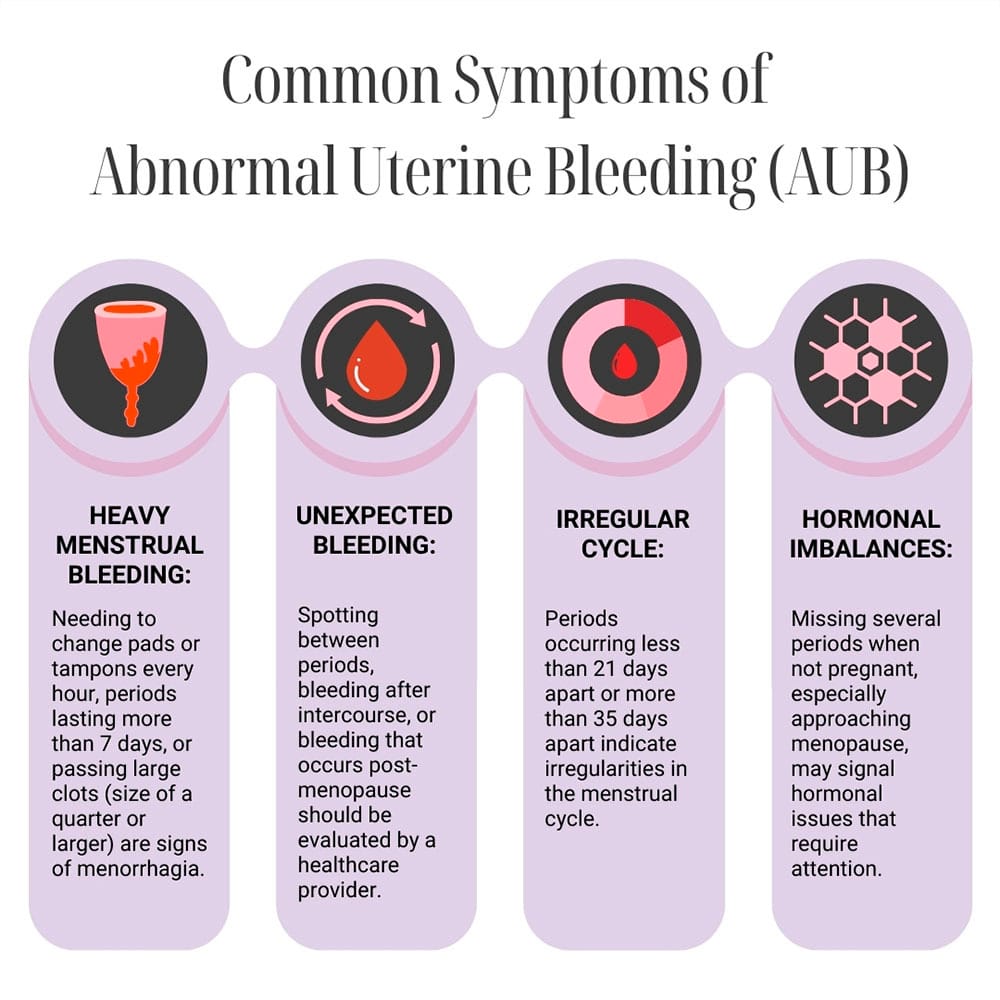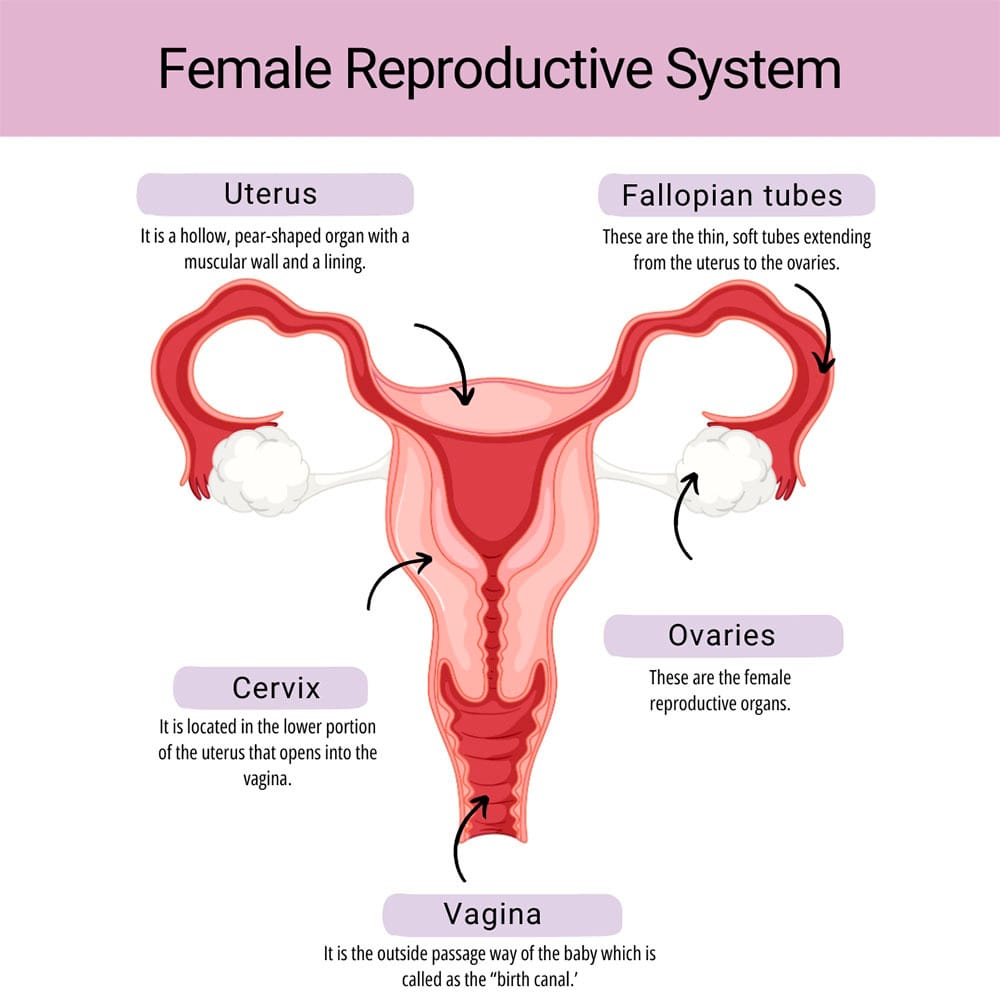What Is Abnormal Uterine Bleeding?
 Abnormal uterine bleeding (AUB) is an unusual vaginal bleeding from your uterus that’s irregular, either in timing, volume or duration, compared to your typical menstrual cycle. This can happen due to many factors ranging from hormonal imbalances or changes in your uterine structure to perimenopausal bleeding that’s become unreliable.
Abnormal uterine bleeding (AUB) is an unusual vaginal bleeding from your uterus that’s irregular, either in timing, volume or duration, compared to your typical menstrual cycle. This can happen due to many factors ranging from hormonal imbalances or changes in your uterine structure to perimenopausal bleeding that’s become unreliable.
If your period extends beyond the typical seven days, it may be considered abnormal. Prolonged menstrual bleeding is not normal and is considered a form of AUB, which interferes with your daily life and could be a sign of a serious underlying condition.
Dr. Felix Cohen, a board-certified gynecologist, provides expert care to diagnose properly and provide effective treatment for any type of abnormal bleeding outside of normal menstrual cycles. No matter what type of gynecological condition you’re dealing with in New York, Cohen Medical Practice (CMP) delivers the best service. They specialize in feminine health and gynecological surgery to ensure you get the best treatment possible.
What Are the Common Symptoms of Abnormal Uterine Bleeding?
If your period is excessively heavy with prolonged menstrual bleeding — needing to change your pad more frequently, passing large blood clots or having bleeding that disrupts your daily activities — it might be a sign of menorrhagia. You must pay attention to any bleeding that occurs at times when you don’t expect your period.
Other common symptoms of abnormal uterine bleeding include:
- Unexpected bleeding such as spotting, bleeding after period ends or bleeding mid-cycle
- Periods come too frequently, less than 21 days apart or too infrequently, more than 35 days apart
- Bleeding after having intercourse, which may seem minor but can be related to changes in your cervix
If you’ve missed several months of periods when you’re not pregnant or approaching menopause, this can be caused by hormonal imbalances or other health issues. Postmenopausal bleeding is never normal; if you’ve gone through menopause and suddenly start bleeding again, it could be a sign of uterine cancer.

What Causes Abnormal Vaginal Bleeding?
Your menstrual cycle is controlled by hormones like estrogen and progesterone. If these hormones are out of balance, it can lead to irregular bleeding. Conditions such as polycystic ovary syndrome or thyroid problems may be the source of this imbalance which could be causing your symptoms.
Other common reasons why you might experience AUB include:
- Small growths of uterine polyps that form on the inner lining of your uterus
- Non-cancerous growths, such as uterine fibroids, that develop in your uterus
- Endometriosis that causes endometrial bleeding when tissue that mimics the lining of your uterus starts growing outside the uterus
- Adenomyosis, when the lining of your uterus grows into the uterine muscle wall
- An abnormal uterus that affects fertility and triggers AUB
Thyroid conditions, like hypothyroidism or hyperthyroidism, and the use of hormonal contraception such as the pill, patch or an intrauterine device (IUD) can also affect your menstrual cycle and lead to abnormal bleeding after periods.
What Are Treatment Options for Abnormal Uterus Bleeding?
Various medical treatment options for abnormal vaginal bleeding are available, such hormone replacement therapy, which can regulate your cycle and reduce excessive bleeding. Your doctor may suggest birth control pills, progesterone therapy or a hormonal IUD to serve as a long-term solution.
If you prefer non-hormonal treatments or can’t take hormones, other medications may be recommended like non-steroidal anti-inflammatory drugs, tranexamic acid or iron supplements.
When medication isn’t sufficient, surgical options may be necessary, such as:
- Hysteroscopy. This involves inserting a small lighted tube into your uterus through your vagina to identify and remove any growths like polyps or fibroids.
- Dilation and curettage. This is a common procedure that allows your doctor to dilate your cervix and remove tissue from the lining of your uterus.
- Endometrial ablation. This procedure destroys the lining of your uterus to reduce or stop your periods, if endometrial bleeding is severe.
- Uterine artery embolization. This procedure may be an option when fibroids are causing your AUB. It’s done to cut off the blood supply to the growths, causing them to shrink and reducing vaginal bleeding.
- Hysterectomy surgery. In the most severe cases when cancer is a concern, this procedure removes your uterus permanently and ends AUB, but also prevents future pregnancies.

How Is Abnormal Uterine Bleeding Diagnosed?
Your doctor starts by reviewing your medical history and the history of your menstrual cycles. A pelvic exam and pap smear are also important in diagnosing abnormal uterine bleeding as your doctor checks for signs of infection or structural abnormalities in your reproductive organs.
Other common diagnostic procedures used to detect AUB include:
- Blood tests to check hormone levels, thyroid function, blood clotting and complete blood count
- Hysterosalpingogram, to provide your doctor with clearer images of your uterus
- Endometrial biopsy, checking for infections, inflammation or cancer in the uterine lining
Dr. Felix Cohen specializes in diagnosing and treating complex gynecological conditions like abnormal uterine bleeding. Whether you need hormone therapy, medications or a surgical option, contact Cohen Medical Practice (CMP) in Midtown NYC today.

